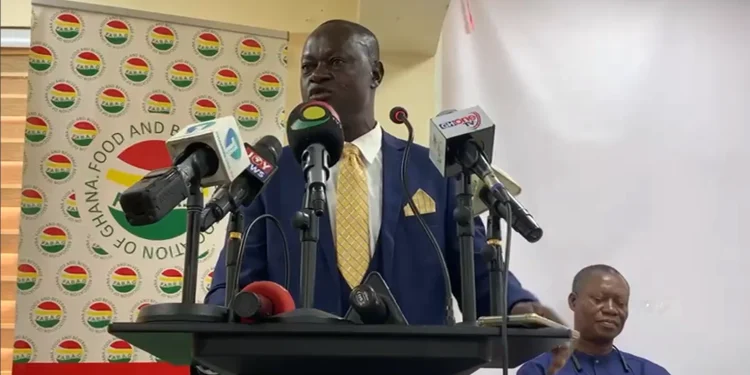Three major business associations the Food and Beverages Association of Ghana (FABAG), the Plastic Manufacturers Association of Ghana, and the Ghana Union of Traders Association (GUTA) have jointly petitioned President John Dramani Mahama to initiate a comprehensive reform of the Electricity Company of Ghana (ECG) within 30 days.
The groups say the utility provider’s persistent inefficiencies, financial mismanagement, and operational lapses are crippling industries and undermining efforts to revive Ghana’s economy.
Their petition follows ECG’s proposal to the Public Utilities Regulatory Commission (PURC) seeking a 225% increase in its Distribution Service Charge (DSC1) between 2025 and 2030 a move the associations describe as “unjustifiable and dangerous” to local businesses.
At a joint press conference in Accra, Rev. John Awuni, Chairman of FABAG, said the proposed tariff increment would “destroy industries” and derail the government’s flagship 24-hour economy agenda.
“Power is the foundation of production. Without affordable electricity and water, the 24-hour economic agenda of the NDC government will fail,” he said.
“It’s not just about availability of power if industries cannot afford the cost, production will stall, demand will drop, and no business can sustain 24-hour operations under such conditions.”
Rev. Awuni argued that ECG’s justification for the tariff hike is weak, especially when Auditor-General’s reports have consistently shown that the company records over 40% annual losses due to inefficiency, theft, and corruption.
The associations are urging President Mahama to direct the immediate launch of an executive reform plan for ECG, complete with measurable performance indicators and oversight from a presidential task force to ensure transparency, accountability, and improved service delivery.
They contend that a modernized, efficient, and financially disciplined power sector is crucial to boosting industrial productivity, attracting investment, and sustaining Ghana’s 24-hour economy vision.
“Electricity must not become a luxury item. It should be affordable and reliable enough to drive production, create jobs, and keep Ghana’s industries competitive,” Rev. Awuni emphasized.
Source: www.kumasimail.com



































































